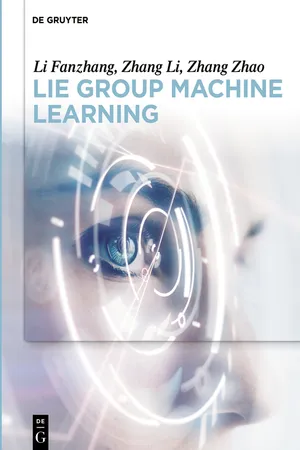
- 533 pages
- English
- PDF
- Available on iOS & Android
Lie Group Machine Learning
About this book
This book explains deep learning concepts and derives semi-supervised learning and nuclear learning frameworks based on cognition mechanism and Lie group theory. Lie group machine learning is a theoretical basis for brain intelligence, Neuromorphic learning (NL), advanced machine learning, and advanced artifi cial intelligence. The book further discusses algorithms and applications in tensor learning, spectrum estimation learning, Finsler geometry learning, Homology boundary learning, and prototype theory. With abundant case studies, this book can be used as a reference book for senior college students and graduate students as well as college teachers and scientific and technical personnel involved in computer science, artifi cial intelligence, machine learning, automation, mathematics, management science, cognitive science, financial management, and data analysis. In addition, this text can be used as the basis for teaching the principles of machine learning.
Li Fanzhang
is professor at the Soochow University, China. He is director of network security engineering laboratory in Jiangsu Province and is also the director of the Soochow Institute of industrial large data. He published more than 200 papers, 7 academic monographs, and 4 textbooks.
Zhang Li
is professor at the School of Computer Science and Technology of the Soochow University. She published more than 100 papers in journals and conferences, and holds 23 patents.
Zhang Zhao
is currently an associate professor at the School of Computer Science and Technology of the Soochow University. He has authored and co-authored more than 60 technical papers.
Tools to learn more effectively

Saving Books

Keyword Search

Annotating Text

Listen to it instead
Information
Table of contents
- Preface
- Contents
- 1. Lie group machine learning model
- 2. Lie group subspace orbit generation learning
- 3. Symplectic group learning
- 4. Quantum group learning
- 5. Lie group fibre bundle learning
- 6. Lie group covering learning
- 7. Lie group deep structure learning
- 8. Lie group semi–supervised learning
- 9. Lie group kernel learning
- 10. Tensor learning
- 11. Frame bundle connection learning
- 12. Spectral estimation learning
- 13. Finsler geometric learning
- 14. Homology boundary learning
- 15. Category representation learning
- 16. Neuromorphic synergy learning
- 17. Appendix
- Authors
- Index
Frequently asked questions
- Essential is ideal for learners and professionals who enjoy exploring a wide range of subjects. Access the Essential Library with 800,000+ trusted titles and best-sellers across business, personal growth, and the humanities. Includes unlimited reading time and Standard Read Aloud voice.
- Complete: Perfect for advanced learners and researchers needing full, unrestricted access. Unlock 1.4M+ books across hundreds of subjects, including academic and specialized titles. The Complete Plan also includes advanced features like Premium Read Aloud and Research Assistant.
Please note we cannot support devices running on iOS 13 and Android 7 or earlier. Learn more about using the app